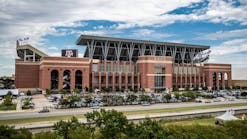Last week, the New Jersey General Assembly passed a bill that will allow municipalities throughout the state to enact ordinances establishing voluntary video surveillance camera registries. These registries would enable home and businesses owners to share their cameras with local law enforcement who could use footage from these feeds to investigate crimes that may have taken place in the area.
"This will help law enforcement officials with investigations of criminal activity and save valuable time and resources by providing them with a registry to determine whether a camera is located near where criminal activity occurred," said Ralph Caputo (D-Essex), who sponsored the bill along with Thomas Giblin (D-Essex/Passaic), Cleopatra Tucker (D-Essex), Gordon Johnson (D-Bergen)., Charles Mainor (D-Hudson) and Shavonda Sumter (D-Bergen/Passaic). "We've seen many cases where captured footage has assisted an investigation, including the recent abduction in Philadelphia. Providing police with a registry like this will make that assistance more common, and that can only be a good thing for public safety."
Any ordinance enacted under the bill is to require the following information to be provided in the municipal registry
- The name of the person who owns a private outdoor video surveillance camera
- The person's most recent contact information, including a street address and telephone number
- The street address where the camera is located;
- The number of cameras that are installed at the location
- The outdoor areas recorded by the camera
- Information on how the camera's footage is saved or stored and the duration of time the footage is saved or stored; and
- Any other information the municipality deems necessary.
Under the bill, a "private outdoor video surveillance camera," is defined as a device installed outside a residence or business that captures footage of the area outside the residence or business for security purposes.
The bill further provides that information contained in a municipal private outdoor video surveillance camera registry is to be made available only to law enforcement officials investigating criminal activity and will not be considered a public record.
A state, county, or municipal law enforcement agency would be authorized to contact a person who registered a private outdoor video surveillance camera in order to request access to footage that may be useful to a criminal investigation. A person who registers a camera may voluntarily submit the camera's footage to a law enforcement agency, but would not be required to do so under the bill.
The bill was approved 58-11-0 and now heads to the Senate for further consideration.


